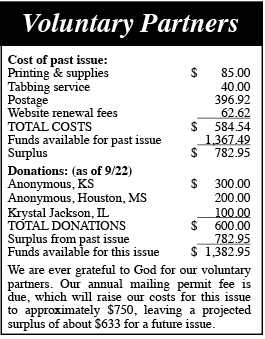|
|

| Examining Our Hedges
By AL DIESTELKAMP
|
The
literal definition of a hedge is “a fence or boundary formed by closely
growing bushes or shrubs.” Metaphorically, the word is used to describe
any barrier or limit intended to keep one from “going too far.” It is a
protection against the human tendency to step in the wrong direction.
In religious discussions hedges have gotten a bad rap! Often, when
questioning a practice or behavior the charge will be issued, “You’ve
set up a hedge,” as if that is a bad thing to do. In this article I
want to challenge that notion before I go on to the “flip side” and
consider some negative side effects of some of the hedges we have set
up.
Keep in mind that calling an unscriptural practice a hedge does not
make it one, nor does it make it scriptural. Error by any other name is
still error. Admittedly, we have modern technology and conveniences
that we justify under general authority that were not available to our
first century brethren. Some of these raise questions that are not
specifically addressed in Scripture. This calls for the employment of
good judgment, which may call for some hedges against likely abuse.
It appears to me that the apostle Paul built up a hedge in his personal
life in choosing to live a celibate life. Clearly, he understood that
he had a right to “take along a believing wife” (1 Cor. 9:5). However,
because of a “present distress” he recommended for himself and others
the single life to hedge against being distracted from the cause of
Christ (1 Cor. 7:25ff). The apostle was quick to identify this as a
hedge by saying that “if you do marry, you have not sinned” (v.28)
The controversies regarding the eating of certain meats and the observance of special days seem to be examples of first century
hedges that the apostle Paul had to address
| (Rom.
14). Notice that he did not condemn the ones who refused to eat meat,
but told them to obey their consciences without condemning those who
ate meat. The same is true regarding the observance of special days.
Those who possibly hedged against putting their confidence in the
observance of “days and months and seasons and years” (Gal. 4:10-11) by
abstaining from any such observances were not to be shunned, nor were
they to impose their hedge on others.
All of us have hedges in our lives whether we admit it or not, and one
would have to be an extreme libertine to deny that some hedges are
helpful. Most parents set hedges for their children. As a hedge against
temptation, a father might forbid his child from searching the web
while alone in his room. By doing so he is not saying that such a
practice would be inherently wrong, but that it would serve as a hedge
against what is wrong and harmful.
While it is not inherently wrong for a married man or woman to have a
one-on-one business lunch with a person of the opposite sex, wisdom
would suggest a hedge to avoid any practice that might raise suspicion
of impropriety. The same is true in regard to private one-on-one Bible
studies with persons of the opposite sex.
Likewise, shepherds of a local congregation might make decisions
intended to avoid future “short-step” departures. Even if the first
step is not wrong, in and of itself, if experience has shown that an
apparently innocent practice tends to open the way for what is
unauthor- ized, it is prudent to hedge against it. To see the value of
reasonable hedges one only has to observe how far sectarian churches
(as well as some of our brethren) have gone. In their eagerness to
remove hedges they have embraced what is unauthorized.
| The
Pharisees come to mind whenever this subject is brought up. No doubt,
they were big into hedge building. In fact, when we are charged with
hedge building we are often charged with being “pharisaical.” Yes,
Jesus did rebuke the Pharisees of the first century who were focused on
tithing even the spices in their homes while neglecting “weightier
matters” (Matt. 23:23), but His rebuke was for the neglect—not for the
tithing. In fact, He said they should have done both. The main problem with the Pharisees was hypocrisy. Even their hedges
tended to be self-serving, designed to maintain their positions of
power.
For the most part, I don’t believe our hedges are from impure motives,
but there can still be some unintended consequences. If a hedge is
viewed as something that can never be crossed under any circumstance,
it becomes a wall instead of a hedge. In such a case we would likely
begin to build a hedge around a hedge.
Without bringing into this article a list of possible hedges, let me
give just one example of what I am writing about. I remember many years
ago a congregation being asked if, in case of a disaster, their
building could be used as a temporary emergency shelter for the
residents of a nearby nursing home. The brethren rejected the request
on the basis that it was not a work of the church. I believe that was
an unfortunate decision that came about because the hedge against
indiscriminate use of the church’s property became a wall instead of a
hedge.
My appeal is not to rip out all hedges, but to recognize them for what
they are—hedges and not walls. Reasonable hedges are beneficial for
individuals, as well as for families, or even the collective activities
of local congregations, but we must not try to impose them universally.
_________________________________________
260 N. Aspen Dr., Cortland, IL 60112
e-mail: aldiestel@gmail.com
|
|
| 
By DAVID DIESTELKAMP |
|
By KARL DIESTELKAMP
You are in a Bible study and the teacher speaks so only about half of
those present can hear him. Someone near the back responds and speaks
so softly that those in the front struggle to hear him. He
probably had something important to contribute. A person near the front
speaks only loudly enough for the teacher to hear him. This is not only
a problem for those of us who are hard of hearing.
A preacher is preaching the gospel. He
gets to a point in his delivery where he drops his voice, speaking
softly. When he is asked why he drops his voice he says, “I do that for
effect.” Well, the “effect” is that many in his audience didn’t hear
what he said. My father, Leslie, often said, “A speaker’s first
responsibility is to be heard; otherwise it doesn’t matter what he
says.”
Let’s trot out the microphones! O.K. Put
it on, or stand behind it, then, please forget about it, and speak to
your whole audience as though the mic was not there. When you speak,
determine to be heard, whether leading prayer, reading scripture,
teaching, preaching, leading singing and even making announcements. If
you lead public prayer in a “still small voice,” head bowed, speaking
to the floor, how can one “…say the Amen at your giving of thanks,
seeing he knows not what you say” (1 Cor. 14:16).
Jesus spoke to a “great multitude, so that
he entered into a boat, and sat; and all the multitude stood on the
beach. And he spoke to them…” (Matt. 13:2,3). Frequently, his hearers
were multitudes (Matt. 5:1-7:29, even outdoors; 11:7; 15:29-31; 19:2;
23:1), and it is clear that they were able to hear his voice. Peter,
“standing up with the eleven, lifted up his voice, and spoke forth unto
them” (Ac. 2:14). At least 3000 heard him—no mic; brethren, “lifted up
their voice to God” (Ac. 4:23,24). The church in Jerusalem reached
“about 5000 men” (Ac. 4:4). How did they all hear when they worshiped
together? Can you imagine teaching such a crowd and not having to
really “speak up”?
I plead for the edification of everyone, not just the hearing impaired, but including them.
__________________________________________________
8311 - 27th Ave., Kenosha, Wisconsin 53143
e-mail: kdiestel@execpccom |
For most people, it
seems like faith just sort of happens (or doesn’t). In other words,
they have faith (or don’t), but they don’t really know why. To them
it’s a feeling, something they’ve just always known was for them, or it
just seems right, something they can’t imagine being without (or for
some, it’s not).
Bible faith is way more than this. Bible faith involves…
• Thinking: “…think on these things” Phil. 4:8
• Reasoning: "…he reasoned” Ac. 17:2
• Reading: “…have you not read” Matt. 12:3
• Understanding: “do you understand” Ac. 8:30
• Trusting: “Abraham… went” Heb. 11:8
True faith doesn’t just somehow happen, we have to fully participate.
Reasonable Faith
Faith has always been word-based, whether coming
directly from God (i.e., speaking directly to Adam and Eve or Moses),
or through a messenger (i.e., an angel or a prophet). True faith is a
response to communication from God. “So then faith comes by hearing,
and hearing by the word of God” (Rom. 10:17).
That means that a person takes the Word of
God, determines it to be from God, then listens to it, tries to
understand the message God intended, and then makes necessary personal
applications. This requires thinking and reasoning. Faith is a
conclusion that is based on information. It isn’t a guess or a feeling.
Trusting Faith
Biblical faith is not simply a compilation of true
or important facts. Able sacrificed. Noah built. Abraham went. Sarah
conceived. Isaac blessed. Joseph worshipped. Moses refused and forsook.
All these, and more, from Hebrews chapter 11 highlight the trust aspect
of true faith.
Faith is not simply confidence in the
truth of the believed; it is confidence in God who said it. Our
trusting faith is in God, and that gives us confidence that what He has
said is true, is best for us, will happen (or did happen), is good,
etc. True faith trusts.
Faith Faith
Faith is not sight, and it won’t be sight until
heaven. “Now faith is the substance of things hoped for, the evidence
of things not seen” (Heb. 11:1). No matter how much proof there is for
the things we have faith in, it will never be enough to become sight.
Faith based on evidence gives us assurance of the reality of things we
can’t see and hope for. It sounds funny to say that we need faith that
is faith, but it’s true. Some people want faith that is sight. They
don’t want to have to reason and trust. They insist seeing is
believing, but actually, seeing is seeing. The question is whether we
will truly trust God, and put faith in Him, even when we can’t see.
That’s true faith. Do you have true faith?
__________________________________________________________________________
940 N. Elmwood Dr., Aurora, Illinois 60506
e-mail: davdiestel@yahoo.com
|

| Truth: The Best That We Can Do
|
By ANDY DIESTELKAMP
My
father-in-law Ward Ellsworth died in his sleep in the early morning of
August 5, 2017. His health had deteriorated in the last few years until
his body could no longer fight off infection. In the months leading up
to his death, his wife and daughters were able to care for him in his
home. His mind was sound and sharp to the end, and this provided him
hours of opportunity to reminisce with family and friends.
Eulogies are occasions to praise the good that someone has
accomplished. Some might observe that eulogies are unbalanced
historical accounts which emphasize only the good and ignore the bad.
Nevertheless, God’s grace teaches us that this is a gracious thing to
do. Eulogies cannot preach sinners into heaven, but eulogies can be
occasions for us to reflect on the good that God can accomplish with
flawed people. In Hebrews 11 we find brief eulogies of men and women of
faith. Abraham and Sarah are eulogized as people of faith, but we might
recall several specific negative incidents in their lives that were not
faithful (e.g. Gen. 16:1-6). It is noteworthy that God does not
remember Abraham and Sarah for their laughing at His promises (Gen.
17:17; 18:12) but remembers them for their faith (Heb. 11:8-12, 17-19).
My father-in-law and I were not always in agreement on matters of
doctrinal application. However, I have chosen to elaborate on what I
believe was the best good that he did. I have chosen to focus on
something he did that is challenging yet achievable for all of us by
God’s grace—to seek, know, obey, apply, and take a stand for truth.
That is the best any of us can do. Truth is the basis of everything
that is of enduring value. Truth is the foundation of faith. Truth is
at the heart of hope. Truth is the language of true love. These are the
things that abide and remain even after the fires have consumed our
homes or the hurricanes have blown or washed everything away or death
has claimed our mortal bodies.
|
However, we may feel quite uncomfortable discussing the subject of
truth in a mixed crowd because there is a lot of disagreement about the
specifics of what constitutes truth. Indeed, many are quite cynical and
skeptical about truth. We have political opinions, economic opinions,
religious opinions, moral opinions, parental opinions, social opinions,
and so on. However, let us never draw the unwarranted conclusion that
our varying and conflicting opinions are evidence that truth is
something that is situational, personal, evolving, unattainable, and
never absolute. When my father-in-law heard someone say that there is
no such thing as absolute truth, he would consistently show the
self-defeating nonsense of such sophistry by asking, “Is that
absolutely true?” He believed that there is such a thing as objective
truth which supersedes and is unfazed and unchanged by our opinions.
As a public school teacher from 1956 to 1982, my father-in-law was very
concerned by the changes that he saw taking place in the public schools
in his lifetime wherein truth was being compromised and redefined to
suit the subjective feelings and wants of a culture increasingly
focused on self and on the natural world rather than on nature’s God.
It became his passion to get to the root of and expose the thinking
which was drastically changing the teachers, their teaching, their students, and ultimately the culture into people who fancied
themselves (as he was prone to observe) “so ‘open-minded’ that their
brains fell out.” Do not misunderstand what might be taken as a
closed-minded insult. My father-in-law was very much for open-minded
seeking of truth. However, minds which are open to the very idea that
there is no objective truth to pursue have lost the ability to be
taught and guided by anything other than their own feelings. The
prophet Isaiah said, “Woe to those who call evil good, and good evil;
who put darkness for light, and light for darkness; who put bitter for
sweet, and sweet for bitter!” (Is. 5:20). |
When Jesus was on trial before Pilate, He was asked by Pilate if He was
a king. Jesus‘ response was, “You say rightly that I am a king. For
this cause I was born, and for this cause I have come into the world,
that I should bear witness to the truth. Everyone who is of the truth
hears My voice” (Jn. 18:37). The response of skeptical Pilate was,
“What is truth?” (vs. 38). It is not Jesus’ words but Pilate’s words
which have become the mantra of our skeptical age in which most people
find the assertion that there is objective truth to be too rigid and
intolerant.
Yes, my father-in-law’s passion for truth manifested itself in a
variety of ways that were generally unpopular, but it was the best good
he ever did. His stand for families against the covert work of humanism
in the public schools was trailblazing. His support of parents taking
personal responsibility for the education of their children was
unequivocal. Of course, all of this was driven by faith in God and His
Word which guided everything he did—from raising and guiding his own
family, to helping others educate their children, to his pursuit of the
primitive pattern of faith and practice revealed in Scripture apart
from pop-Christianity. Yes, his passion for these things would get
eye-rolls from many people, including newspaper editors and readers and
even his own brethren and family at times. However, in our “What is
truth?” culture, he kept repeating the truth in the hopes that someone
was listening; and some were listening and some will listen still; and
so Dad, like Abel of old, through his faith, though he died, he still
speaks (Heb. 11:4).
_________________________________________
323 E. Indiana Ave., Pontiac, Illinois 61764
e-mail: andydiestelkamp@gmail.com
|
Back to top
BEING AN ENABLER
|
|
By RICK LIGGIN |
|
In
the field of civil law, there are sometimes people who “aid and abet”
criminals, and there are also those who “contribute to the delinquency
of a minor.” To do either of these is against the law, and those who do
it become criminals themselves. In the field of psychology, there are
sometimes people who are identified as “enablers,” because they enable
others (often their own loved ones) to be involved in addictive
behavior. “Enablers” are not necessarily people who would themselves
participate in the addictive conduct; they may actually even oppose it.
But by their actions they make it easy for the addict to continue in
his addiction.
In spiritual matters, we also unfortunately have
people who “aid and abet” evildoers, or who “contribute to the
delinquency” of sinners, or who be- come “enablers” of those who are
doing wrong! Now, you might be thinking of those who practice deeds
that are “worthy of death,” while also giving “hearty approval” to
those who practice “such things” (Romans 1:32). But these are not the
“enablers” we are talking about. The “enablers” we are talking about
would not practice the sins that they “aid and abet.” In fact, they
would oppose and carefully avoid such practices in their own lives. And
yet, they enable others (especially when the “others” are their own
family or loved ones) to practice sinful behavior. How does that happen? In what way do they “aid and abet” evildoers or “enable” those who are given to sin
|
Often, it is done by downplaying the person’s sin or by even
offering excuses for the “poor helpless sinner.” More often than not,
they enable sinners by their silence. Instead of lovingly confronting
the sinner (Matt. 18:15) and exposing his crime (Eph. 5:11), they
ignore the sin and pretend it isn’t really happening. Even worse, they
hamper the local church’s efforts to correct the sinner by continuing
to socialize and associate with the one who has been collectively
disciplined by the group (1 Cor. 5:1-13). When will we learn that this
does not help the sinner to correct his ways? It only enables him to
continue in his evil deeds!
Don’t you dare be an “enabler” of sin! Don’t you dare “contribute to
the delinquency” of one who is caught up in a trespass or “aid and
abet” a sinner in the error of his way! Instead, be an encourager and
“enabler” of that which is good, even if it means you must confront and
oppose someone you love. If you really love someone in sin, you will
not enable him to continue in the error of his way; you will, instead,
do whatever you can to turn him back to God…to “save his soul from
death” and to “cover a multitude of sins” (Jas. 5:19-20).
________________________________________________________________
318542 Crestline Road, Humble, Texas 77396
e-mail: sp63@mac.com
|
Back to top
Raymond & Velva Breuer:
Long Lives...Well-Spent
Raymond and Velva Breuer were both cousins of my
father, though they were not related to one another prior to marriage.
He died August 4, 2017 and she died August 6, 2017, both at the age of
97, and having been married 77 years.
After his retirement from Ford Motors, Raymond “redeemed his time”
fruitfully by preaching and working the next 10 years with the church
in Warne, North Carolina. Eventually they returned to Missouri
where he served as one of the elders of the church in Hallsville,
Missouri.
Even when their advanced age required them to move into a “retirement
home” they did not retire from spiritual work but instead, Raymond
started a weekly class called “Bible Study With Ray” for residents of
that facility.Through the years Velva was a “keeper at home” and a
faithful partner of Raymond, as well as loving mother to six children.
Raymond and Velva never retired from service to the Lord until they
died. Now they can rest from their labors. May their number increase!
|
The Lesson of 'Perezuzza'
After Aaron and his sons had prepared the holy objects and furnishings
of the tabernacle, “...the sons of Kohath shall come to carry them...”
(Num. 4:15). Moses was commanded to put “poles into the rings on the
sides of the ark, to carry the ark with them” (Ex. 25:14). The
Kohathites were to carry the ark “on their shoulders” (Num. 7:9). Years
later, David decided to transport the ark on a “new cart” (1 Chron.
13:7). While it was an act motivated by good intent, participated in
with zeal, approved by the leaders and the people, “The anger of the
Lord” struck Uzza dead and David called that place “Perezuzza” (1
Chron. 13:1-11 kjv). He learned the lesson—they must respect what “the
Lord chose” (1 Chron. 15:2). So next time “the sons of the Levites
carried the ark of God on their shoulders, with the poles thereon as
Moses had commanded according to the word of the Lord” (1 Chron.
15:15). “Carry” is generic as to how and who, but gathering all the
pertinent facts and harmonizing them indicated the authority was
specific as to who and how. We, too, better learn the lesson of
“Perezuzza” and respect what “the Lord chose”!
________________________________________________________________
18542 Crestline Road, Humble, Texas 77396
e-mail: sp63@mac.com
|
Back to top
Back to top

|

By STEVE FONTENOT
Here
in the Houston, Texas, area we have just been through an epic flood.
While water was the means of destruction, thousands of people were
saved from destruction by that very water as they entered boats that
lifted them above the destruction and carried them to safety. While
water was a means used in their deliverance, would anyone call this
“water salvation,” as if the power were in the water? It was by the
grace of the responders and the people’s faith to enter the boat that
resulted in their deliverance.
Peter wrote that eight people were “saved by water” (1 Pet. 3:20, kjv;
“saved through [by means of] water” nkjv, asv) in the greatest flood of
all. Was that “water salvation”? Noah was saved by the grace of God
(Gen. 6:8) and his faith to build and enter the ark (Heb. 11:7).
“Corresponding to that, baptism now saves you” (1 Pet. 3:21, nasb;
“There is an antitype which now saves us, namely baptism” nkjv).
The fact that “baptism now saves you” is no more “water salvation” than
in the case of Noah or in the local flood here in Texas. It is by the
grace of God who sent His son to die for us and was raised from the
dead (“through the resurrection of Jesus Christ” v.21) and our faith to
obey that results in our being saved—“He who believes and is baptized
will be saved” (Mk. 16:16 nkjv).
__________________________________________________________________________________
18542 Crestline Road, Humble, Texas 77396
e-mail: sp63@mac.com
|
|
|
About Think's Editor -
Al Diestelkamp
CONTACT US
Copyright 2009 Think on
These Things
The content of this site is copyrighted but may be freely used as long
as you give credit to this website as your source.
|












